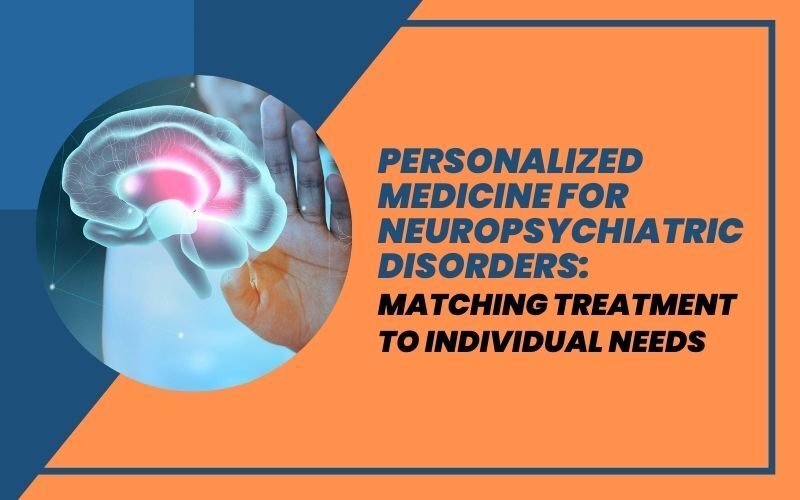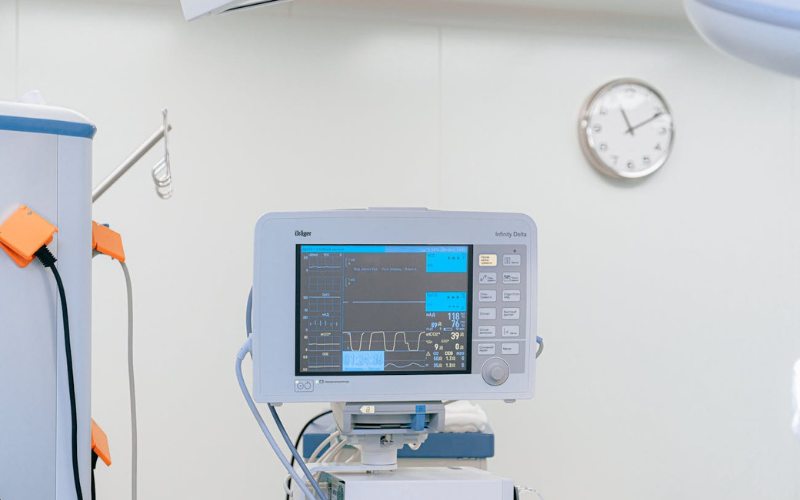Introduction
Personalized Medicine for Neuropsychiatric Disorders: Matching Treatment to Individual Needs
Neuropsychiatric disorders, such as depression, anxiety, bipolar disorder, schizophrenia, and others, can significantly impact an individual’s quality of life. Unfortunately, finding the right treatment for these conditions can be a challenging and lengthy process. This is where personalized medicine comes in, which is an approach to healthcare that tailors treatment to the individual based on their unique genetic, environmental, and lifestyle factors.
What is Neuropsychiatric disorders?
Neuropsychiatric disorders are a group of mental illnesses that are caused by abnormalities in the brain’s structure or function. These disorders can affect a person’s thoughts, emotions, and behavior, and can have a significant impact on their quality of life. Neuropsychiatric disorders can range from relatively mild conditions, such as anxiety and depression, to more severe conditions, such as schizophrenia and bipolar disorder.
Symptoms of Neuropsychiatric Disorders:
The symptoms of neuropsychiatric disorders can vary depending on the specific condition. Some of the most common symptoms include:
Mood changes: Individuals with neuropsychiatric disorders may experience changes in their mood, such as feeling sad, anxious, or irritable.
Cognitive impairment: Neuropsychiatric disorders can affect a person’s ability to think clearly, remember things, or make decisions.
Behavioral changes: Individuals with neuropsychiatric disorders may exhibit changes in behavior, such as becoming more withdrawn or agitated.
Psychotic symptoms: Some neuropsychiatric disorders, such as schizophrenia, can cause hallucinations and delusions.
Types of Neuropsychiatric Disorders:
There are many different types of neuropsychiatric disorders, and they can be grouped into several categories based on their symptoms and causes. Some of the most common categories include:
Mood Disorders: Mood disorders, such as depression and bipolar disorder, are characterized by changes in a person’s mood.
Anxiety Disorders: Anxiety disorders, such as generalized anxiety disorder and panic disorder, are characterized by excessive worry and fear.
Psychotic Disorders: Psychotic disorders, such as schizophrenia, are characterized by changes in thinking and perception, such as hearing voices or having delusions.
Substance Use Disorders: Substance use disorders, such as addiction to drugs or alcohol, can cause changes in behavior and thinking.
Neurodevelopmental Disorders: Neurodevelopmental disorders, such as autism and attention-deficit/hyperactivity disorder (ADHD), are caused by abnormalities in brain development.
Causes of Neuropsychiatric Disorders:
The causes of neuropsychiatric disorders can vary depending on the specific condition. In some cases, the cause may be a combination of genetic and environmental factors, while in others, the cause may be unknown. Some common causes of neuropsychiatric disorders include:
Genetics: Some neuropsychiatric disorders, such as schizophrenia, have been linked to genetic factors.
Brain Abnormalities: Abnormalities in the structure or function of the brain can cause neuropsychiatric disorders.
Environmental Factors: Exposure to certain environmental factors, such as stress or trauma, can increase the risk of developing neuropsychiatric disorders.
Substance Abuse: Substance abuse can increase the risk of developing neuropsychiatric disorders.
Treatment of Neuropsychiatric Disorders:
The treatment of neuropsychiatric disorders can vary depending on the specific condition and the individual’s symptoms. Some common treatments include:
Medications: Medications, such as antidepressants or antipsychotics, can be used to manage the symptoms of neuropsychiatric disorders.
Therapy: Therapy, such as cognitive-behavioral therapy, can help individuals with neuropsychiatric disorders learn new coping skills and improve their overall well-being.
Lifestyle Changes: Making changes to one’s lifestyle, such as getting regular exercise or improving one’s diet, can also be beneficial in managing the symptoms of neuropsychiatric disorders.
Overall, neuropsychiatric disorders are a group of mental illnesses that can have a significant impact on an individual’s quality of life. These disorders can cause a variety of symptoms, ranging from mood changes to cognitive impairment. While the causes of these disorders can vary, there are many treatment options available that can help individuals manage their symptoms and improve their overall well-being.
Personalized Medicine for Neuropsychiatric Disorders: Matching Treatment to Individual Needs
Personalized medicine for neuropsychiatric disorders involves using a variety of tools and techniques to identify the specific factors that contribute to an individual’s condition. These may include genetic testing, neuroimaging, cognitive testing, and various questionnaires to assess symptoms and lifestyle factors. Based on this information, clinicians can then develop a treatment plan that is tailored to the individual’s needs.
One example of personalized medicine in neuropsychiatric disorders is pharmacogenomics, which is the study of how an individual’s genetic makeup affects their response to medications. By analyzing an individual’s genetic profile, clinicians can identify which medications are likely to be most effective and which ones may cause harmful side effects. This can help reduce the trial and error process of finding the right medication for a given individual and reduce the risk of adverse reactions.
Another example of personalized medicine is the use of neuroimaging techniques to assess brain function and identify areas of dysfunction. This information can then be used to develop targeted interventions, such as transcranial magnetic stimulation (TMS), which is a non-invasive treatment that uses magnetic fields to stimulate specific regions of the brain. TMS has been shown to be effective in treating a variety of neuropsychiatric disorders, including depression, anxiety, and obsessive-compulsive disorder.
In addition to these specific techniques, personalized medicine for neuropsychiatric disorders also involves a collaborative approach between clinicians, patients, and their families. This may include education about the condition, strategies for managing symptoms, and support for lifestyle changes that can improve overall health and well-being.
One of the key benefits of personalized medicine for neuropsychiatric disorders is the potential to reduce the burden of these conditions on individuals, families, and society as a whole. By identifying the specific factors that contribute to an individual’s condition and tailoring treatment accordingly, clinicians can improve outcomes and reduce the risk of harmful side effects from ineffective treatments. Additionally, personalized medicine can help reduce the stigma associated with these conditions by emphasizing that they are treatable medical conditions that require specialized care.
While personalized medicine for neuropsychiatric disorders is a relatively new approach, it has already shown great promise in improving outcomes and reducing the burden of these conditions. As research continues to advance, it is likely that this approach will become even more refined and effective, ultimately leading to better care and improved quality of life for individuals with neuropsychiatric disorders.
Advantages and Disadvantages of Personalized Medicine for Neuropsychiatric Disorders:
Personalized medicine, which is the approach of tailoring medical treatment to an individual’s unique genetic, environmental, and lifestyle factors, has shown great promise in the field of neuropsychiatric disorders. However, as with any medical approach, there are both advantages and disadvantages to consider.
Advantages of Personalized Medicine for Neuropsychiatric Disorders:
Tailored Treatment: One of the most significant advantages of personalized medicine is that it allows for tailored treatment. With the use of genetic testing and other diagnostic tools, clinicians can identify which medications and treatments are most likely to be effective for a specific individual. This can reduce the trial-and-error process of finding the right treatment and improve outcomes.
Reduced Adverse Reactions: Personalized medicine can also reduce the risk of adverse reactions to medications. By analyzing an individual’s genetic profile, clinicians can identify which medications may cause harmful side effects and avoid prescribing them.
Improved Outcomes: Personalized medicine has the potential to improve outcomes for individuals with neuropsychiatric disorders. By tailoring treatment to the individual, clinicians can better target the specific factors that contribute to their condition and improve overall health and well-being.
Reduced Stigma: Personalized medicine can also help reduce the stigma associated with neuropsychiatric disorders. By emphasizing that these conditions are treatable medical conditions that require specialized care, personalized medicine can reduce the shame and isolation that individuals may experience.
Disadvantages of Personalized Medicine for Neuropsychiatric Disorders:
Cost: One of the major disadvantages of personalized medicine is cost. The use of genetic testing and other diagnostic tools can be expensive, and these costs may not be covered by insurance. This can create a barrier to accessing personalized medicine for some individuals.
Limited Access: In addition to cost, personalized medicine may also be limited in terms of access. Some diagnostic tools and treatments may only be available in certain regions or to individuals with certain healthcare plans. This can create disparities in access to care.
Complexity: Personalized medicine is a complex approach that requires specialized knowledge and training. This can make it difficult for some clinicians to implement in their practice and may limit its availability.
Ethical Considerations: Finally, there are ethical considerations to personalized medicine, particularly in the area of genetic testing. While genetic testing can be valuable for identifying the most effective treatments for an individual, it also raises questions about privacy and the potential for discrimination based on genetic information.
In overall, personalized medicine for neuropsychiatric disorders has the potential to improve outcomes and reduce the burden of these conditions on individuals and society. However, there are also important considerations to keep in mind, including cost, access, complexity, and ethical considerations. By carefully weighing the advantages and disadvantages of personalized medicine, clinicians and patients can make informed decisions about their healthcare.
Conclusion
personalized medicine is a promising approach for the treatment of neuropsychiatric disorders. By tailoring treatments to the unique needs of each individual, personalized medicine can improve treatment outcomes and reduce the risk of negative side effects. This approach involves the use of advanced diagnostic tools and genetic testing to identify biomarkers that can help guide treatment decisions. While personalized medicine is still a relatively new field, it has shown great promise in the treatment of conditions such as depression, anxiety, and schizophrenia. As research in this area continues to evolve, personalized medicine has the potential to revolutionize the way we treat neuropsychiatric disorders, providing more effective and targeted therapies that improve the lives of individuals living with these conditions.
FAQS
Q: What is personalized medicine for neuropsychiatric disorders?
A: Personalized medicine is an approach to treating neuropsychiatric disorders that involves tailoring treatments to the unique needs of each individual. This is done through the use of advanced diagnostic tools and genetic testing to identify biomarkers that can help guide treatment decisions.
Q: What are the benefits of personalized medicine for neuropsychiatric disorders?
A: The benefits of personalized medicine for neuropsychiatric disorders include improved treatment outcomes, reduced risk of negative side effects, and more efficient use of healthcare resources.
Q: What types of neuropsychiatric disorders can be treated with personalized medicine?
A: Many different types of neuropsychiatric disorders can be treated with personalized medicine, including depression, anxiety, bipolar disorder, schizophrenia, and more.
Q: How is personalized medicine for neuropsychiatric disorders different from traditional treatments?
A: Traditional treatments for neuropsychiatric disorders often involve a trial-and-error approach, where a medication is prescribed and then adjusted based on the individual’s response. With personalized medicine, treatments are tailored to the unique needs of each individual, based on their specific biomarkers and genetic profile.
Q: Is personalized medicine for neuropsychiatric disorders covered by insurance?
A: It depends on the individual insurance plan. Some plans may cover genetic testing and other diagnostic tools used in personalized medicine, while others may not. It’s important to check with your insurance provider to see what is covered.
Q: Is personalized medicine for neuropsychiatric disorders suitable for everyone?
A: Personalized medicine may not be suitable for everyone, as it involves the use of advanced diagnostic tools and genetic testing that may not be available or appropriate for all individuals. It’s important to discuss the benefits and risks of personalized medicine with a healthcare provider to determine if it is right for you.
Q: Is personalized medicine for neuropsychiatric disorders currently available?
A: Yes, personalized medicine for neuropsychiatric disorders is currently available, although it is still a relatively new and evolving field. As research in this area continues to evolve, more advanced diagnostic tools and treatments may become available.




